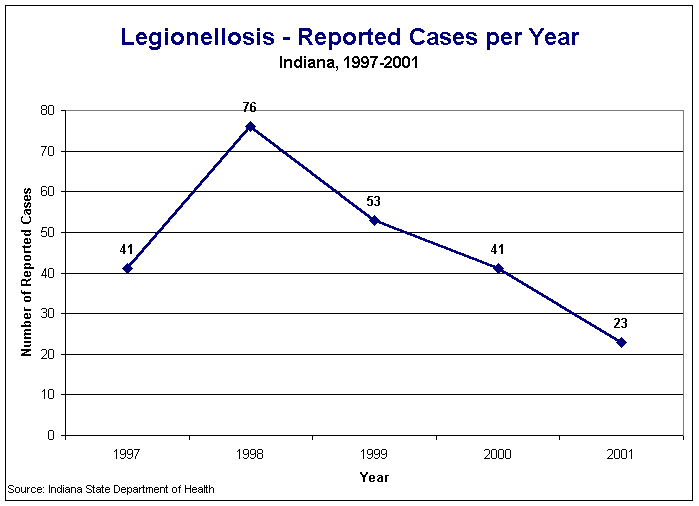Figure Leg1: Legionellosis - Reported Cases per Year, Indiana, 1997-2001

2001 Indiana Report of Infectious Diseases |
View CDC's Legionellosis page
Rates presented are per 100,000 population and are based on the 2000 U.S. Census.
| Cases | Incidence Rate |
|
| Total | 23 | 0.4 |
| Race-specific cases and rates1 | ||
| White | 14 | 0.3* |
| Black | 5 | 1.0* |
| Other2 | 0 | |
| Sex-specific cases and rates | ||
| Female | 8 | 0.3* |
| Male | 15 | 0.5* |
Legionellosis is a respiratory infection caused by Legionella bacteria, most commonly Legionella pneumophila. These bacteria are transmitted by contaminated water aerosols, which are then inhaled. Those at greatest risk of acquiring infection are those over age 50, especially with a history of smoking, and those with weakened immune systems. The severe form of legionellosis, commonly known as "Legionnairesí Disease", is characterized by pneumonia, fever, and myalgia. A milder, self-limiting form of the illness, known as Pontiac Fever, is characterized by fever, cough, and myalgia. Neither infection is transmissible person-to-person.
There were 23 cases of legionellosis reported in Indiana in 2001, for a rate of 0.4 cases per 100,000 population. This represents a 44% decrease over the previous year. In addition, the incidence was well below the previous five-year average incidence of 47 cases (Figure Leg1). Legionellosis infection occurs any time of year, and there does not appear to be any seasonal pattern.
Age-specific rates were highest among adults ages 60-69 (1.4) and adults ages 70 and older (1.1) (Figure Leg2). The sex-specific rate for males (0.5) was higher than that for females (0.3). The race-specific rate for blacks (1.0) was higher than that for whites (0.3).
There were no outbreaks of legionellosis reported in Indiana in 2001.
Back to Top of Article
Back to Table of Contents
|
Figure Leg1: Legionellosis - Reported Cases per Year, Indiana, 1997-2001 |
|
|
Back to Reference in Text
Back to Top of Article
|
|
Back to Reference in Text
Back to Top of Article
1 - Race was unknown for 4 of the reported cases.
2 - "Other" includes American Indian/Alaska Native, Asian, Native Hawaiian/Pacific Islander, and multiracial.
* - Rate based on less than 20 cases and should be considered unstable.
Back to Table of Contents
[an error occurred while processing this directive]